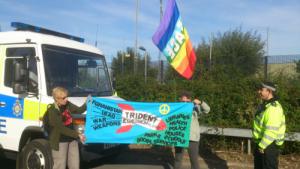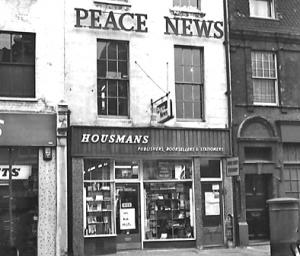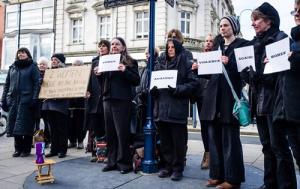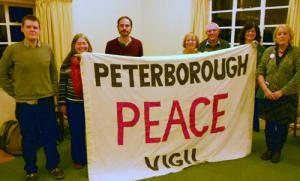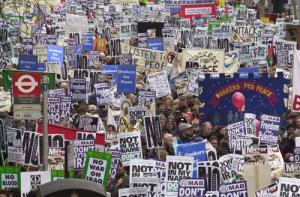On 5 September, Yorkshire peace activist Lindis Percy repeatedly disobeyed an illegal police instruction not to cross a yellow line painted on the road outside ‘RAF’ Menwith Hill – a spy base run by the US national security agency.
Lindis, who has held a weekly vigil outside Menwith for many years, previously won a ruling that she could go 18 inches beyond the line as it did not have planning permission.
Lindis therefore crossed the line and was carried back by the…
Anti-war action
On 21 August, Horsham magistrates court found Chris Osmond of No Borders and Shiar Youssef of Boycott Israel Network not guilty of criminal trespass.
Their eight-hour occupation of the roof of security company G4S on 2 July 2012 was a protest at G4S’s illegal activities and human rights abuses, particularly in its UK immigration detention centres and in Israeli prisons serviced by the company.
The judge avoided ruling on G4S’s activities but found the occupation did not…
On 2 September, 21 people were arrested as Action AWE and Trident Ploughshares held an international – Argentine, Belgian, Dutch, English, Finnish, French, German, Japanese, Spanish and Scottish – blockade of AWE Burghfield in Berkshire. ‘Atomic Weapons Establishment’ Burghfield and AWE Aldermaston nearby are where Britain’s nuclear weapons are produced. Action AWE and Trident Ploughshares…
In the months since the Torness demonstration in May and the London anti-Windscale demo some kind of anti-nuclear movement has appeared. Discussion of how nuclear power can be opposed is shifting from isolated actions to the development of campaigns. The Torness Alliance is an attempt (experimental and perhaps inevitably frustrating) at developing mutual co-ordination of the efforts of local autonomous groups.
That development will be very difficult without a growth and…
On 21 August, a military judge sentenced the 25-year-old US army private formerly known as Bradley Manning to 35 years in prison, with time served (almost three years) in pre-trial custody counted towards this.
The next day, Bradley Manning publicly asked to be referred to as Chelsea Manning from that point on, and asked people to use the feminine pronoun to refer to her (except in official post to the prison), saying: ‘I am a female’.
The judge in Manning’s trial counted…
On 11 August, for the first time in 16 years of protest, peace activists completely stopped traffic into and out of Germany’s largest joint US-German air force base – for 24 hours.
Over 750 people converged on Büchel to protest against the continued storage there of 20 US nuclear weapons, in violation of the nuclear non-proliferation treaty.
After a large ‘happening’ at the main gate, teams with overnight camping gear drove to the base’s eight gates.
Each blockade was…
On 7 August, at the Scottish court of appeal in Edinburgh, the crown dropped its prosecution of peace activist Barbara Dowling for allegedly failing to fully complete her census form in 2011.
When Barbara’s legal team appealed an earlier decision by Glasgow sheriff court, the appeal court ruled that a further evidential hearing would be necessary, and the crown dropped the case.
Many withheld co-operation from Scotland’s 2011 census in protest at the involvement of a British…
On 21 August, St Paul city council in Minnesota, USA, voted to proclaim 27 August ‘Kellogg-Briand Peace Pact Day’ in celebration of the 85th anniversary of the signing of the Kellogg-Briand Pact which ‘condemn[ed] recourse to war for the solution of international controversies, and renounce[d] it, as an instrument of national policy’.
While the world was aggressively preparing for the First World War between 1900 and 1914, many people and organisations in Britain and Europe were boldly campaigning for peace. This is not generally remembered because that war destroyed so much, even the memory that many people had tried to stop it happening.
So amongst the military and political pressures of preparing for war, with its Boer War inadequacies, Dreadnought battleship-building, Baden Powell boy-scouting and much more,…
Halabja Chemical Bombing, 1988, oil (120 x 100cm), Saqqez. IMAGE: Osman Ahmed.
There were many chemical attacks on Kurdish villages in northern Iraq by Saddam Hussein’s army in 1987 and 1988. Osman himself was a witness and victim of the chemical attack and once went blind for a few days, hiding in a cave.
This image was made in 1988 after the attacks and…
On 29 January, Swedish peace campaigner Martin Smedjeback was sentenced to 14 days in prison for an action he carried out on 29 July 2011 with Annika Spalde. The pair entered air force base F21 in Luleå in northern Sweden and painted the air strip pink.
Aberystwyth Women in Black Photo: Keith Morris
From a Machynlleth production of the Vagina Monologues, via flash-mob dancing in Lampeter, Carmarthen, Swansea and Cardiff, to Women in Black’s silent vigil in Aberystwyth, Wales was very much part of One Billion Rising. Two women die by the hands of their partners every week in the UK, say Women’s Aid, with one incident of domestic violence reported to the police every minute.
No wonder Aberystwyth Women in Black’s silent vigil…
The vigil recalled when two million people spoke up — and those in power in Westminster turned a deaf ear.
At the Cardiff vigil, Jill Gough, national secretary of CND Cymru, said: ‘Wales was in uproar in the weeks leading up to that demonstration. The phone rang continuously…. It did feel as if the whole world was on the streets for peace on 15 February’.
Adam Johannes of Cardiff Stop the War remembered: ‘I will never forget the hope we all felt that…
Peace News author Ian Sinclair (far left) wove his magic in Peterborough on 26 February, talking to a goodly crowd of 23 (at the first public meeting held by the peace group for two years) about his new book about the 15 February 2003 anti-war demo: The march that shook Blair. Afterwards, Ian was interviewed by Peterborough Community Radio. Peace News Press launched the book on 15 February in Friends House, London, hosted by Quaker Peace and Social Witness, with a panel…
‘On this evidence, the big march was shock and awe from the bottom up; it came within a hair’s breadth of derailing the warmongers and still shapes our politics today.’ Joe Glenton, Afghan war veteran and author of Soldier Box(Verso)
According to polling, over 1¼ million people took part in Britain’s biggest-ever political protest: the 15 February 2003 anti-war march in London against the invasion of Iraq. There is a widespread feeling — among both activists and the…


